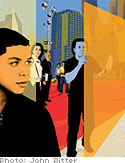
Our survival instincts say one thing (Take sides! Fight back! It's us against them!) Our better instincts say another (We're in this together! United we stand!). What does it take to turn "them" into "us?"
It took a crisis for me to recognize how quickly, how consistently and deliberately, I threw up the screen that shielded me from "them"—the suffering, the poor, the unlucky, the unchic, the unheard of, the unfit the unfunny...until the night of [the 9/11] TV newscast, when I found "them" in myself. Now I see "us" everywhere, often unexpectedly, always gratefully.
—Valerie Monroe
More nuggets of wisdom that can help you bridge the gap.
Read more inspirational stories for other concrete, practical ways to lessen the gaps, heal the rifts, and get from "them" to "us."
It took a crisis for me to recognize how quickly, how consistently and deliberately, I threw up the screen that shielded me from "them"—the suffering, the poor, the unlucky, the unchic, the unheard of, the unfit the unfunny...until the night of [the 9/11] TV newscast, when I found "them" in myself. Now I see "us" everywhere, often unexpectedly, always gratefully.
—Valerie Monroe
More nuggets of wisdom that can help you bridge the gap.
Read more inspirational stories for other concrete, practical ways to lessen the gaps, heal the rifts, and get from "them" to "us."

In the amazing, disquieting movie Crash, writer-director Paul Haggis confronts a whole rainbow of stereotypes—and the fact that most of us are more prejudiced, and in more ways, than we'd like to think.
In Crash, an affluent white woman slips an arm through her husband's and draws him near as two young black men walk toward them. "She got colder as soon as she saw us," grumbles one of the men, who also complains about being disrespected in the diner they just left. "You see any white people waiting 132 minutes for a plate of spaghetti?" he asks. And when his friend points out that the waitress was black, too, he responds, "You don't think black people think in stereotype?" When the two indeed turn out to be muggers, the husband (an ambitious district attorney) frets, "Why did these guys have to be black? No matter how we spin this, I'm either going to lose the black vote or the law-and-order vote." To counter the bad PR, he wants to be photographed pinning a medallion on a dark-skinned cop. Regrettably for him, the first eligible candidate is an Iraqi named Saddam.
And that's just the beginning. Through the film's wildly diverse characters—black, white, Hispanic, Asian, Middle Eastern, overly pampered, tattooed, and drug addicted, all intersecting because of a car accident—Canadian writer-director Paul Haggis targets every permutation of racial prejudice he could find in Los Angeles. A carjacking in his adopted home of almost 30 years was the genesis for the film.
"When I came out of the shock, I was intensely curious about those two kids who took the car. I wondered who they were, if it was the first time they'd done this, how long they'd been friends, if they were friends. And then I thought of the guy who came to change our lock at 2 in the morning—what if he'd been Hispanic, with shaved hair and a baggy T-shirt? I hate asking myself troubling questions."
In Crash, an affluent white woman slips an arm through her husband's and draws him near as two young black men walk toward them. "She got colder as soon as she saw us," grumbles one of the men, who also complains about being disrespected in the diner they just left. "You see any white people waiting 132 minutes for a plate of spaghetti?" he asks. And when his friend points out that the waitress was black, too, he responds, "You don't think black people think in stereotype?" When the two indeed turn out to be muggers, the husband (an ambitious district attorney) frets, "Why did these guys have to be black? No matter how we spin this, I'm either going to lose the black vote or the law-and-order vote." To counter the bad PR, he wants to be photographed pinning a medallion on a dark-skinned cop. Regrettably for him, the first eligible candidate is an Iraqi named Saddam.
And that's just the beginning. Through the film's wildly diverse characters—black, white, Hispanic, Asian, Middle Eastern, overly pampered, tattooed, and drug addicted, all intersecting because of a car accident—Canadian writer-director Paul Haggis targets every permutation of racial prejudice he could find in Los Angeles. A carjacking in his adopted home of almost 30 years was the genesis for the film.
"When I came out of the shock, I was intensely curious about those two kids who took the car. I wondered who they were, if it was the first time they'd done this, how long they'd been friends, if they were friends. And then I thought of the guy who came to change our lock at 2 in the morning—what if he'd been Hispanic, with shaved hair and a baggy T-shirt? I hate asking myself troubling questions."

By sparing nobody—and infuriating practically everybody—comedian Bill Maher makes us all stop, think, face the truth, and (okay) laugh.
A few months ago, Bill Maher was at Dodger Stadium, and when his picture flashed on the JumboTron, half the audience cheered and half booed. Which was fine with Maher. "I'm an easy boo," says the host of HBO's Real Time with Bill Maher and author of New Rules. "If you're going to tell the truth, you're going to alienate people. I'm not a Democrat, not a Republican, and I know that's unsettling to people. In America everybody has to be on a team, and they work backward from: 'How can I defend the team I'm on?' We're way too conformist in this country. There aren't enough people who have opinions that are unsettling."
When Maher loads, cocks, and aims his opinions, he forces us to confront stereotypes and bigotry, using humor to fake out our defenses. Few comedians manage to push the boundaries of our comfort zone about "otherness" quite so far or so well. And Maher is an equal-opportunity zinger—nobody is exempt. "If you have to tell me what fraction of you is Native American, you're not really an Indian," he jokes. "There's a word for people who claim to be one-quarter Indian: Puerto Rican." And you've got to admire how he slams jihadists and rednecks in one fell swoop: "If you don't want the world to think your religion is medieval, stop beheading people. Texans are bloodthirsty and dim, and even they learned to use an electric chair."
The political landscape of the country is still a favored target for the comedian, particularly the color theme of the last election, "in which blue-staters were convinced everything between New York and Los Angeles was one giant forest where Ned Beatty was constantly being sodomized by hillbillies, and red-staters were told that people like me spend all our time performing abortions and figuring out new ways to desecrate the flag. Please, they're just hobbies."
A few months ago, Bill Maher was at Dodger Stadium, and when his picture flashed on the JumboTron, half the audience cheered and half booed. Which was fine with Maher. "I'm an easy boo," says the host of HBO's Real Time with Bill Maher and author of New Rules. "If you're going to tell the truth, you're going to alienate people. I'm not a Democrat, not a Republican, and I know that's unsettling to people. In America everybody has to be on a team, and they work backward from: 'How can I defend the team I'm on?' We're way too conformist in this country. There aren't enough people who have opinions that are unsettling."
When Maher loads, cocks, and aims his opinions, he forces us to confront stereotypes and bigotry, using humor to fake out our defenses. Few comedians manage to push the boundaries of our comfort zone about "otherness" quite so far or so well. And Maher is an equal-opportunity zinger—nobody is exempt. "If you have to tell me what fraction of you is Native American, you're not really an Indian," he jokes. "There's a word for people who claim to be one-quarter Indian: Puerto Rican." And you've got to admire how he slams jihadists and rednecks in one fell swoop: "If you don't want the world to think your religion is medieval, stop beheading people. Texans are bloodthirsty and dim, and even they learned to use an electric chair."
The political landscape of the country is still a favored target for the comedian, particularly the color theme of the last election, "in which blue-staters were convinced everything between New York and Los Angeles was one giant forest where Ned Beatty was constantly being sodomized by hillbillies, and red-staters were told that people like me spend all our time performing abortions and figuring out new ways to desecrate the flag. Please, they're just hobbies."

The same techniques that keep marriages strong, says therapist Harville Hendrix, can end conflict between nations. It starts with trying on someone else's reality.
Falling in love is like a temporary inoculation against reality. It's about idealized feelings between two people in which they see connections ("You like the color blue, too!") rather than distinctions. But there comes a time in most marriages when the oneness shatters. "That phenomenon is what I've been addressing for many years," says Harville Hendrix, PhD, a marital and relationship expert and the author of Getting the Love You Want.
For most couples, the romantic interlude of a new relationship leads to an inevitable truth, says Hendrix—"a slow discovery of the other as 'not the person I thought he was.' The breaking of that illusion is one of the most shocking and terrifying experiences of married life. There's an actual change in brain chemistry—levels of dopamine fall while levels of adrenaline and cortisol rise—as people go from excitement to frustration, fear, conflict, and opposition." In the power struggle, partners move from courtship into coercion, trying to get each other to surrender their "otherness." "This is the second stage of all relationships," Hendrix says. "It's not a pathology." But it's when damage can occur to a couple's children and when the couple often splits up.
Falling in love is like a temporary inoculation against reality. It's about idealized feelings between two people in which they see connections ("You like the color blue, too!") rather than distinctions. But there comes a time in most marriages when the oneness shatters. "That phenomenon is what I've been addressing for many years," says Harville Hendrix, PhD, a marital and relationship expert and the author of Getting the Love You Want.
For most couples, the romantic interlude of a new relationship leads to an inevitable truth, says Hendrix—"a slow discovery of the other as 'not the person I thought he was.' The breaking of that illusion is one of the most shocking and terrifying experiences of married life. There's an actual change in brain chemistry—levels of dopamine fall while levels of adrenaline and cortisol rise—as people go from excitement to frustration, fear, conflict, and opposition." In the power struggle, partners move from courtship into coercion, trying to get each other to surrender their "otherness." "This is the second stage of all relationships," Hendrix says. "It's not a pathology." But it's when damage can occur to a couple's children and when the couple often splits up.

Pro-life, pro-choice—they couldn't agree, but could they be civil? With the help of a therapist, a fiery national debate gives birth to a new dialogue.
Watching a televised debate about abortion in 1989, with the pro-choice and pro-life advocates going after each other like pit bulls, Laura Chasin got to thinking. "It occurred to me that I wouldn't put up with this if it were happening in my office," remembers Chasin, then a therapist on faculty at the Family Institute of Cambridge in Massachusetts, "and neither would any of my colleagues. If a family is embattled, we know how to help make something more constructive happen. A lightbulb went off: I wondered if some of what we do with couples could be adapted to people embroiled in civic and political conflict."
Yes, it could. Chasin recruited six of her coworkers and started the Public Conversations Project (PCP), inviting local people who expressed interest in a dialogue about reproductive freedom to come talk to one another. "We said that the only goal was mutual understanding. It would not be an opportunity to try to persuade, meaning we had some ground rules." Incendiary name-calling (such as "baby killer" or "religious fanatic") was forbidden, and questions had to convey genuine curiosity (no "Don't you think your position is stupid?"). The initial 20 meetings usually involved six people and were set for three hours. "It's always hard to end," says Chasin, "once the horns and tails are removed, and you begin to see areas of shared concerns." With such an encouraging start, PCP considered expanding to other charged subjects. "We thought this way of bringing together people who are at loggerheads needed to travel," recalls Chasin, "and we were full of exploration energy, when John Salvi happened."
John C. Salvi III was the student hairdresser who, in 1994, stormed two women's health clinics in suburban Boston, killing the receptionists at both and wounding five others. Governor William Weld and Cardinal Bernard Law jointly called for "common ground" talks. PCP doesn't use the language "common ground" because, Chasin points out, when it comes to abortion, people hear that phrase and think they'll have to make an unacceptable compromise. "But we felt an obligation to see if the situation was ripe for some kind of engagement across the divide," she says.
Six women leaders from both sides of the issue agreed to meet in secret, but it was just about their only point of consensus—they couldn't even decide on how to refer to what grows in a pregnant woman's womb.
Watching a televised debate about abortion in 1989, with the pro-choice and pro-life advocates going after each other like pit bulls, Laura Chasin got to thinking. "It occurred to me that I wouldn't put up with this if it were happening in my office," remembers Chasin, then a therapist on faculty at the Family Institute of Cambridge in Massachusetts, "and neither would any of my colleagues. If a family is embattled, we know how to help make something more constructive happen. A lightbulb went off: I wondered if some of what we do with couples could be adapted to people embroiled in civic and political conflict."
Yes, it could. Chasin recruited six of her coworkers and started the Public Conversations Project (PCP), inviting local people who expressed interest in a dialogue about reproductive freedom to come talk to one another. "We said that the only goal was mutual understanding. It would not be an opportunity to try to persuade, meaning we had some ground rules." Incendiary name-calling (such as "baby killer" or "religious fanatic") was forbidden, and questions had to convey genuine curiosity (no "Don't you think your position is stupid?"). The initial 20 meetings usually involved six people and were set for three hours. "It's always hard to end," says Chasin, "once the horns and tails are removed, and you begin to see areas of shared concerns." With such an encouraging start, PCP considered expanding to other charged subjects. "We thought this way of bringing together people who are at loggerheads needed to travel," recalls Chasin, "and we were full of exploration energy, when John Salvi happened."
John C. Salvi III was the student hairdresser who, in 1994, stormed two women's health clinics in suburban Boston, killing the receptionists at both and wounding five others. Governor William Weld and Cardinal Bernard Law jointly called for "common ground" talks. PCP doesn't use the language "common ground" because, Chasin points out, when it comes to abortion, people hear that phrase and think they'll have to make an unacceptable compromise. "But we felt an obligation to see if the situation was ripe for some kind of engagement across the divide," she says.
Six women leaders from both sides of the issue agreed to meet in secret, but it was just about their only point of consensus—they couldn't even decide on how to refer to what grows in a pregnant woman's womb.




